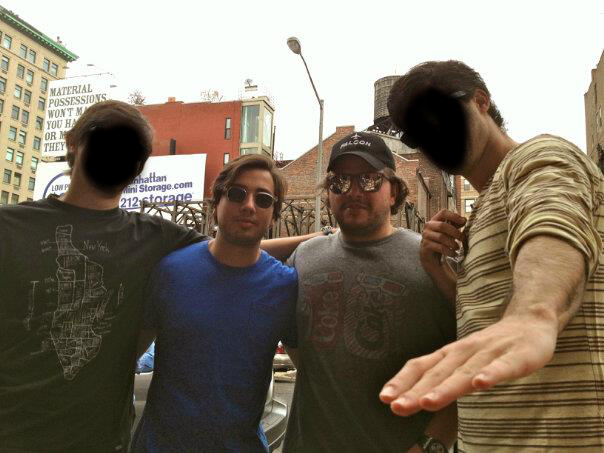Forget about Tiny Rowland and his African adventures as imperialist entrepreneur and dealmaker. The unacceptable face of capitalism has morphed into its XXI century iteration: bankers. This meme of bankers as the world’s worst has been appropriated and “occupied” by the Left. And the argument has been set up as one between “capitalism” and the power of the state. It may seem odd for someone like me to bash capitalism and entrepreneurship, but seeing what some “capitalist” bankers and banks are doing these days, I can't help but empathise with the "progressive" trend to paint bankers as the parasites on the world’s productive class.
Case in point is JP Morgan, one of the world's most respected banks. Its operations in Venezuela, for instance, amount to nothing more than a gigantic laundromat for crooks. There's no added value, there's no funding new ventures or contributing positively with wealth creation. Quite the contrary, in fact. Like in China, JP Morgan hires well-connected locals, who cash in on their network of contacts to basically bleed the country. JP Morgan has been in the news a lot recently: its now infamous trader, nicknamed the "London Whale" for the size of his trades, left a $6 billion hole on the books. The Whale is perhaps the perfect case study of bankers gone bonkers, bankers who in the ever-encouraged culture of bonus chasing would put the best robber barons in history to shame. How can it be argued that a trader, with two other colleagues, is allowed to run a $6 billion loss without anyone noticing, without anyone raising the alarm and putting an immediate stop to it?
Let me provide another example with which I have some familiarity, a Venezuelan one. From 2009 and in the space of 14 months, a fly-by-night outfit with zero prior experience -known as Derwick Associates- was granted 12 public contracts for the construction of power plants in Venezuela. The total amount of public money awarded is unknown: none of the contracts were obtained through an open bidding process. However estimates in Venezuelan newspapers last week suggest that total could exceed $3 billion. This is public money we're talking about—not depositor cash. To get anything done, Derwick Associates would partner with American suppliers and contractors, such as ProEnergy Services and its subsidiary Energy Parts Solution. These partners in turn, would require payment, on completion of work. And just how would a company managed by under-30-year-olds lacking a penny to their names pay millions to American subcontractors in a country where there's foreign exchange controls?
Enter JP Morgan. In China, JP Morgan hires the children of communist officials, they are known as "princelings." Since Hugo Chavez left no children willing to go into banking, JP Morgan got the next best thing in Venezuela: children from well-to-do but utterly amoral families to exploit network of contacts built over a lifetime of collusion between politics and business. JP Morgan hired Eduardo Travieso, son of a renowed and respected lawyer by the same name. Travieso would cash in on his old friends from school. One of the Derwick execs, Pedro Trebbau Lopez, went to school with Travieso, so the going must have been something like this: corrupt businessman (Trebbau) needs to pay American contractor (ProEnergy) > old friend Travieso is with JP Morgan > JP Morgan pushes Travieso to bring new business > Travieso offers JP Morgan services to Trebbau > payments to American contractors are wired through JP Morgan > Travieso earns a nice bonus > Trebbau bypasses Venezuelan forex controls and US anti money laundering regulations > JP Morgan gets a new client and makes a few quid along the way. And, off the books, Travieso is provided a payment from Derwick for laundering the Derwick cash. Enabling banks are the most important part in money laundering operations. Without Travieso neither Derwick nor ProEenergy nor JP Morgan could have profited from such murky deals.
Travieso is not the only Venezuelan at JP Morgan dealing with “special” clients from that country. Guillermo Drew-Bear Tamayo [UPDATE: it would appear that as of 11:00 GMT, Drew-Bear Tamayo's Facebook page has been taken offline, while it was fully functional last night], who describes himself to friends as Travieso’s “hermanazo”, sits at a desk not too far from Travieso’s old desk. Drew-Bear LinkedIn profile reads: "Portfolio manager and investment advisor for ultra high net worth families in Latin America. Manage and trade discretionary and brokerage relationships across asset classes including equities, fixed income, foreign exchange, interest rates, options, structured products and alternative investments" at JP Morgan. Since I started posting about Derwick Associates, staff from JP Morgan's offices in New York seem to have taken a particular interest on the subject. Sources have told me that Travieso was sacked early this year due to his dealings with Derwick Associates. But before the alleged dismissal of Travieso, Derwick Associates had sued one of Venezuela's biggest banks (Banco Venezolano de Credito or BVC) for defamation in Florida. After many posts exposing Derwick Associates and its American spin doctors and lawyers as morally bankrupt, Derwick Associates settled out of court with BVC. Around the time Derwick was retreating from its spurious and malicious claims, JP Morgan was dismissing Travieso. Coincidence?

Guillermo Drew-Bear Tamayo (left) and Eduardo Travieso
I called Drew-Bear's office at JP Morgan to ask him about his relationship with Travieso. I also wanted his comments on reports from Venezuela linking him with potentially illegal money laundering operations. He "wasn't at his desk" when I called. I also sent Drew-Bear an email. A person inside the House of Morgan told me that he had read the email but was too scared to pass it on to his managers or ask for advice. Then I called Doug Morris, JP Morgan Head of U.S. Private Bank Media Relations, to request his comment on Travieso, his Venezuelan clients, and the reason for his dismissal. Morris said "unfortunately we just don't comment on those sort of issues at all, so I really couldn't get into it." I also sent an email to Morris, providing some context pertaining the recent lawsuit filed in New York by former Assistant Secretary of Western Hemisphere Affairs Otto Reich against Alejandro Betancourt Lopez, Pedro Trebau Lopez and Francisco D'Agostino of Derwick Associates for racketeering (JP Morgan is mentioned as Derwick Associates banker in the claim), asking whether he could help in setting an interview with Drew-Bear. The reply was "Unfortunately, Mr. Drew-Bear is not available to be interviewed on this subject. As a matter of course, we never comment on client-related issues. We also generally do not comment on personnel matters." Drew-Bear did not consult his superiors about content of my email, neither did Morris according to another source in JP Morgan. It would appear that there's a systemic avoidance of passing bad news up the chain of command at JP Morgan, regardless of roles.
If that lawsuit ever gets to the discovery process JP Morgan is going to suffer yet another blow to its already tarnished reputation. For it is alleged that three powerful officials from the Venezuelan government (including Rafael Ramirez) got kickbaks from Derwick Associates, in the process of securing non-bid contracts. JP Morgan will also have to explain why KYC and other anti money laundering regulations were ignored in transactions on behalf of Derwick Associates. Perhaps JP Morgan’s offices in Midtown Manhattan can become the Zuccotti Park of 2013.

